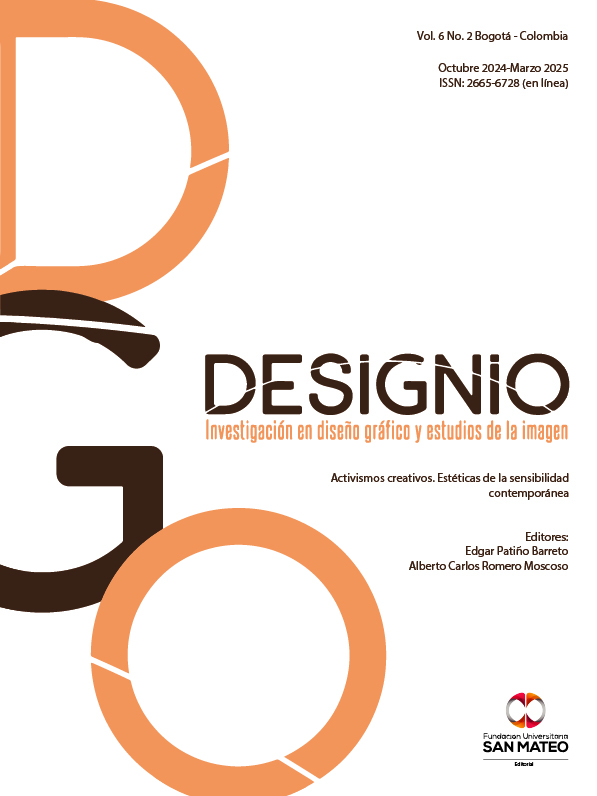Beyond disciplinary limits and traditional learning, methodologies ArtCC Proposal for Communities, Art, Science and Territories in Action
Main Article Content
Abstract
This article contains the interpretative and critical analysis of the sequence of creative, scientific, artistic and cultural processes led by the collective Art + Science = Consciousness (ArtCC), developed in the Coquimbo region Chile. The ArtCC project, implemented since 2020, integrates the knowledge of art and science to promote social and transformative learning. Thus, the problem covered by this research comprises the need to transform the relationships of individuals with their environment, fostering critical thinking, social responsibility and cultural appreciation, specifically in communities, territories and contexts marked by serious social and environmental challenges. This set of problems is addressed through the implementation of innovative and active educational methodologies that break down disciplinary silos and promote collaborative learning environments, inspired by critical pedagogy and education for social transformation. The learning methodology proposed by ArtCC is interdisciplinary and experiential, using play, creativity and collaboration as fundamental tools for learning. This educational and socio-cultural transformation approach has generated a significant impact in the Coquimbo region, showing positive results in various dimensions, from the creation of innovative educational programs to the strengthening of the social and community weave. The ArtCC project is consolidated as an inspiring educational experience with a transforming impact, opening new routes towards a more meaningful, relevant and committed education with the challenges of the XXI century.
Downloads
Article Details

This work is licensed under a Creative Commons Attribution-NonCommercial-NoDerivatives 4.0 International License.
References
Boff, L. (2002). El cuidado esencial. Ética de lo humano compasión por la tierra. Editorial Trotta.
Bourdieu, P. (2001). Poder, derecho y clases sociales (2ª ed.). Desclée de Brouwer.
Calvo, C. (2007). Del mapa escolar al territorio educativo: disoñando la escuela desde la educación. Nueva Mirada Ediciones.
Cantoral, R., Reyes-Gasperini, D. y Montiel, G. (2014). Socioepistemología, matemáticas y realidad. Revista Latinoamericana de Etnomatemática Perspectivas Socioculturales de la Educación Matemática, 7(3), 91-116. https://www.revista.etnomatematica.org/index.php/RevLatEm/article/view/149
Cantoral, R. y Reyes-Gasperini, D. (2014). Socioepistemología y matemáticas: del aula extendida a la sociedad del conocimiento. “Todo lo que siempre quisiste saber y nunca te animaste a preguntar”. En Acta Latinoamericana de Matemática Educativa 27 (1573-1583). Comité Latinoamericano de Matemáticas Educativa. https://funes.uniandes.edu.co/funes-documentos/socioepistemologia-y-matematicas-del-aula-extendida-a-la-sociedad-del-conocimiento-todo-lo-que-siempre-quisiste-saber-y-nunca-te-animaste-a-preguntar/
CEPAL. (2018). Panorama social de América Latina. CEPAL. https://repositorio.cepal.org/server/api/core/bitstreams/5a4765e3-47c5-4ed2-bf2d-273af7927e4f/content
Deleuze, G. (1978). Curso sobre Spinoza. Academia. https://www.academia.edu/31105582/Gilles_Deleuze_Curso_Sobre_Spinoza
Dewey, J. (2010). Experiencia y educación. Biblioteca Nueva.
Freire, P. (1997). Pedagogía de la liberación. Siglo XXI Editores.
Freire, P. (2008). Pedagogía de la autonomía. Saberes necesarios para la práctica educativa (2ª ed.). Siglo XXI.
García Canclini, N. (1990). Culturas híbridas. Estrategias para entrar y salir de la modernidad. Editorial Grijalbo.
Gardner, H. (2016). Estructuras de la mente: la teoría de las inteligencias múltiples. Fondo de Cultura Económica.
Gibbons, M., Limoges, C., Nowotny, H., Scwartzman, S., Scott, P. & Trow, M. (2010). The New Production of Knowledge: The Dynamics of Science and Research in Contemporary Societies. SAGE Publications Ltd.
Hathaway, M. y Boff, L. (2014). El Tao de la liberación. Una ecología de la transformación. Editorial Trotta.
Klein, J. (1990). Interdisciplinarity. History, Theory, & Practice. Wayne State University Press.
Kuhn, T. (2013). La estructura de las revoluciones científicas. Fondo de Cultura Económica.
Leff, E. (2007). La complejidad ambiental. Polis, Revista de la Universidad Bolivariana, 6(16).
Maldonado, C. (2017). Pensar. Lógicas no clásicas. Universidad El Bosque.
McClaren, P. (2005). Critical Pedagogy in the Age of Neoliberal Globalization. En P. Trifonas (eds.), Communities of Difference. Palgrave Macmillan.
Morin, E. (1998). Introducción al pensamiento complejo. Gedisa.
Nicolescu, B. (2002). Manifesto of Transdisciplinarity. State University of New York Press. https://inters.org/Freitas-Morin-Nicolescu-Transdisciplinarity
Nicolescu, B. (2020). Transdisciplinariedad: una esperanza para la humanidad. En F. Dravet et al. (Orgs.), Transdisciplinareidad y educación del futuro (pp. 13-18). Cátedra Unesco de Juventud, Educación y Sociedad.
OEA. (s.f.). La cultura en el desarrollo: una red interamericana de información. https://www.oas.org/es/sedi/ddes/ct/cultura_desarrollo.asp
Stengers, I. (2000). Invention of Modern Science. University of Minnesota Press.
Touraine, A. (1994, marzo 7-10). Las transformaciones sociales del siglo XX. Intergovernmental Council of the MOST. https://red.pucp.edu.pe/ridei/files/2011/08/87.pdf
Unesco. (2010). Objetivos para el desarrollo de la Educación Artística. La Agenda de Seúl: Objetivos para el desarrollo de la educación artística. Seúl. Unesco. https://unesdoc.unesco.org/ark:/48223/pf0000190692_spa
Wallerstein, I. (2007). El moderno sistema mundial: Capitalismo y civilizaciones en el siglo XXI. Siglo XXI Editores.
Zurbriggen, C. y González, M. (2020). Innovación y co-creación: nuevos desafíos para las políticas públicas. Revista de Gestión Pública, 3(2), 329-361. https://doi.org/10.22370/rgp.2014.3.2.2245

